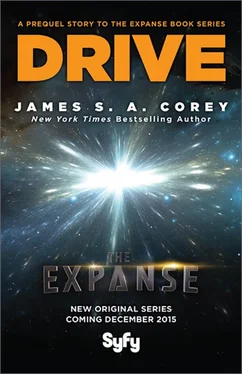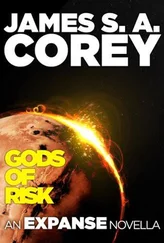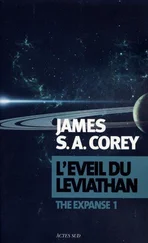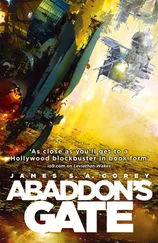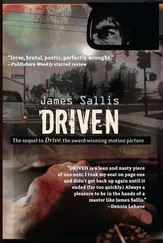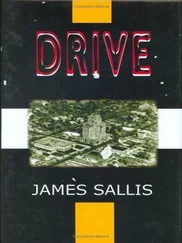James Corey - Drive
Здесь есть возможность читать онлайн «James Corey - Drive» весь текст электронной книги совершенно бесплатно (целиком полную версию без сокращений). В некоторых случаях можно слушать аудио, скачать через торрент в формате fb2 и присутствует краткое содержание. Год выпуска: 2015, Жанр: Старинная литература, на английском языке. Описание произведения, (предисловие) а так же отзывы посетителей доступны на портале библиотеки ЛибКат.
- Название:Drive
- Автор:
- Жанр:
- Год:2015
- ISBN:нет данных
- Рейтинг книги:3 / 5. Голосов: 1
-
Избранное:Добавить в избранное
- Отзывы:
-
Ваша оценка:
- 60
- 1
- 2
- 3
- 4
- 5
Drive: краткое содержание, описание и аннотация
Предлагаем к чтению аннотацию, описание, краткое содержание или предисловие (зависит от того, что написал сам автор книги «Drive»). Если вы не нашли необходимую информацию о книге — напишите в комментариях, мы постараемся отыскать её.
Drive — читать онлайн бесплатно полную книгу (весь текст) целиком
Ниже представлен текст книги, разбитый по страницам. Система сохранения места последней прочитанной страницы, позволяет с удобством читать онлайн бесплатно книгу «Drive», без необходимости каждый раз заново искать на чём Вы остановились. Поставьте закладку, и сможете в любой момент перейти на страницу, на которой закончили чтение.
Интервал:
Закладка:

DRIVE
by James S.A. Corey
Copyright (c) 2012 by Daniel Abraham and Ty Franck
1
Acceleration throws Solomon back into the captain’s chair, then presses his chest like a weight. His right hand lands on his belly, his left falls onto the upholstery beside his ear. His ankles press back against the leg rests. The shock is a blow, an assault. His brain is the product of millions of years of primate evolution, and it isn’t prepared for this. It decides that he’s being attacked, and then that he’s falling, and then that he’s had some kind of terrible dream. The yacht isn’t the product of evolution. Its alarms trigger in a strictly informational way. By the way, we’re accelerating at four gravities. Five. Six. Seven. More than seven. In the exterior camera feed, Phobos darts past, and then there is only the star field, as seemingly unchanging as a still image.
It takes almost a full minute to understand what’s happened, then he tries to grin. His laboring heart labors a little harder with elation. The interior of the yacht is cream and orange. The control panel is a simple touchscreen model, old enough that the surface has started going grey at the corners. It’s not pretty, but it is functional. Solid. An alert pops up that the water recycler has gone off-line. Solomon’s not surprised—he’s outside the design specs—and he starts guessing where exactly the system failed. His guess, given that all the thrust is along the primary axis of the ship, is the reservoir back-flow valve, but he’s looking forward to checking it when the run is finished. He tries to move his hand, but the weight of it astounds him. A human hand weighs something like three hundred grams. At seven g, that’s still only a little over two thousand. He should still be able to move it. He pushes his arm toward the control panel, muscles trembling. He wonders how much above seven he’s going. Since the sensors are pegged, he’ll have to figure it out when the run is over. How long the burn lasted and whatever his final velocity winds up being. Simple math. Kids could do it. He’s not worried. He reaches for the control panel, really pushing it this time, and something wet and painful happens in his elbow.
Oops, he thinks. He wants to grit his teeth, but that’s no more effective than grinning had been. This is going to be embarrassing. If he can’t shut off the drive, he’ll have to wait until the fuel runs out and then call for help. That might be problematic. Depending on how fast he’s accelerating, the rescue ship’s burn will have to be a very long one compared with his own. Maybe twice as long. They may need some sort of long-range craft to come get him. The fuel supply readout is a small number on the lower left side of the panel, green against black. It’s hard to focus on it. Acceleration is pressing his eyeballs out of their right shape. High tech astigmatism. He squints. The yacht is built for long burns, and he started with the ejection tanks at ninety percent. The readout now shows the burn at ten minutes. The fuel supply ticks down to eighty-nine point six. That can’t be right.
Two minutes later, it drops to point five. Two and a half minutes later, point four. That puts the burn at over thirty-seven hours and the final velocity at something just under five percent of c.
Solomon starts getting nervous.
2
He met her ten years before. The research center at Dhanbad Nova was one of the largest on Mars. Three generations after the first colonists dug into the rock and soil of humanity’s second home, progress had pushed the envelope of human science, understanding, and culture so far that the underground city could support five bars, even if one of them was the alcohol-free honky-tonk where the Jainists and born-again Christians hung out. The other four sold alcohol and food that was exactly the same as the stuff they sold at the commissary, only with piped-in music and a wall monitor with an entertainment feed from Earth playing on it all hours of the day and night. Solomon and his cadre met up at this one two or three times a week when the work load at the center wasn’t too heavy.
Usually the group was some assortment of the same dozen people. Today it was Tori and Raj from the water reclamation project. Voltaire whose real name was Edith. Julio and Carl and Malik who all worked together on anti-cancer therapies. And Solomon. Mars, they said, was the biggest small town in the solar system. There was almost never anyone new.
There was someone new. She sat beside Malik, had dark hair and a patient expression. Her face was a little too sharp to be classically beautiful, and the hair on her forearms was dark. She had the kind of genetics that developed a little mustache problem when she hit about thirty-five. Solomon didn’t believe in love at first sight, but as soon as he sat down as the table, he was profoundly aware that he hadn’t brushed his hair very effectively that morning and he was wearing the shirt with the sleeves a little too long.
“Mars is America,” Tori said, waving his beer expansively. “It’s exactly the same.”
“It’s not America,” Malik said.
“Not like it was at the end. Like the beginning. Look at how long it took to travel from Europe to North America in the 1500s. Two months. How long to get here from Earth? Four. Longer if the orbits are right.”
“Which is the first way in which it’s not like America,” Malik said, dryly.
“It’s within an order of magnitude,” Tori said. “My point is that politically speaking, distance is measured in time. We’re months away from Earth. They’re still thinking about us like we’re some kind of lost colony. Like we answer to them. How many people here, just at this table have had directives from someone who’s never been outside a gravity well but still felt like they should tell us where our research should go?”
Tori raised his own hand, and Raj followed suit. Voltaire. Carl. Reluctantly, Malik. Tori’s grin was smug.
“Who’s doing the real science in the system?” Tori said. “That’s us. Our ships are newer and better. Our environmental science is at least a decade ahead of anything they’ve got on Earth. Last year, we hit self-sustaining.”
“I don’t believe that,” Voltaire said. The new one still hadn’t spoken, but Solomon watched her attention shift to each new speaker. He watched her listen.
“Even if there are a few things we still need from Earth, we can trade for them. Shit, give us a few years and we’ll be mining them out of the Belt,” Tori said, backing away from his last point and making a new, equally unlikely assertion at the same time. “It’s not like I’m saying we should cut off all diplomatic relations.”
“No,” Malik said. “You’re saying we should declare political independence.”
“Damn skippy, I am,” Tori said. “Because distance is measured in time.”
“And coherence is measured in beer,” Voltaire said, the cadence of her voice matching Tori’s perfectly. The new woman smiled at the mimicry.
“Even if we decided that all we had to lose was our chains,” Malik said, “why would we bother? We are already de facto our own government. Pointing out the fact is only going to stir up trouble.”
“Do you really think Earth hasn’t noticed?” Tori said. “You think the kids back at the labs on Luna and Sao Paulo aren’t looking up at the sky and saying That little red dot is kicking our asses ? They’re jealous and they’re scared and they should be. It’s all I’m saying. If we do our own thing, the earliest they could do something about it still gives us months of lead time. England lost its colonies because you can’t maintain control with a sixty-day latency, much less a hundred and twenty.”
Читать дальшеИнтервал:
Закладка:
Похожие книги на «Drive»
Представляем Вашему вниманию похожие книги на «Drive» списком для выбора. Мы отобрали схожую по названию и смыслу литературу в надежде предоставить читателям больше вариантов отыскать новые, интересные, ещё непрочитанные произведения.
Обсуждение, отзывы о книге «Drive» и просто собственные мнения читателей. Оставьте ваши комментарии, напишите, что Вы думаете о произведении, его смысле или главных героях. Укажите что конкретно понравилось, а что нет, и почему Вы так считаете.
